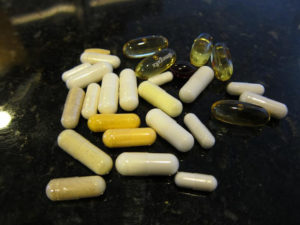Cornucopia’s Take: Dietary supplements are often billed as sources of crucial vitamins and minerals and have become a lucrative industry. Unfortunately, there is little regulation of supplements, and consumers frequently cannot be certain what they are ingesting. Cornucopia recommends people get as much of their nutrients as they can from a wide variety of the healthiest organic, whole foods.
Skip The Supplements — Here Are The Best Foods To Eat Instead
Rodale’s Organic Life
by Markham Heid
You don’t need pricey pills to unlock optimal health.
There’s a lot of good research backing the health benefits of some supplements.
The problem: While the pills used in scientific studies are carefully tested for quality and dosage accuracy, most consumer OTC supplements are largely unregulated, says Mark Moyad, M.D., director of preventive and alternative medicine at the University of Michigan. (Ever get prescribed a drug off-label? Here’s what that means.)
Dr. Moyad explains that few people are checking to make sure your OTC pills are free of heavy metals and other harmful contaminants. There’s even less oversight when it comes to ensuring the pills you’re taking contain the types and amounts of nutrients listed on the label.
“When you’re taking a pill, you’re also taking a lot of not-natural stuff that’s in that pill—stuff like herbicides, pesticides, hormones, the stuff in the capsule or shell itself, allergens, and even sand, which is used as a stabilizer,” he says.
While he’s quick to say that supplements can be hugely helpful if you’re sick or trying to treat a specific medical condition, he says that, if you’re healthy, the risks aren’t really worth it. (Here are 3 Supplements That Are Just Wasting Your Money—and 3 You May Actually Consider.)
“Especially when you see so many of these supplement nutrients are available in food, to take a handful of pills is a crazy,” he says. “If you look at the world’s so-called blue zones where people live longest, they tend not to take any pills at all.”
Here, he offers dozens of foods that ably stand in for supplements men tend to buy. Unlike a supplement, you can’t eat a specific amount of these to ensure a benefit. But by packing your diet with these foods, you’ll bolster your health without the dangers supplements pose.
Take It For: Muscle health
The Details: “Leucine helps stimulate muscle protein synthesis, maybe better than any other amino acid,” Dr. Moyad says.
The Foods: Lean beef, chicken, fish, turkey and eggs. (For a leucine-packed breakfast, try this killer combo.)
Take It For: Heart health
The Details: “Nitric oxide helps keep blood flowing to all parts of the body,” Dr. Moyad says.
The Foods: Beets and beet root juice, spinach, and bok choy (Chinese cabbage)
Take Them For: Eye Health
The Details: Multiple studies, including a 2015 paper in the British Journal of Ophthalmology, have linked these two compounds to improved retinal health and lower rates of age-related macular degeneration—a major cause of vision problems and loss.
The Foods: Kale, spinach, and eggs—including the yolks. “These compounds are fat-soluble,” Dr. Moyad adds. Eat them with avocado or olive oil, and the healthy fats in those foods will help your body absorb more of these nutrients, he says.
Take It For: Preventing runaway inflammation
The Details: “This is basically aspirin in its natural source, and people are always surprised when I tell them they can get it from food,”Dr. Moyad says. Research in Molecular Medicine finds salicylic acid appears to fight pain by controlling inflammation, which might also explain how a low-dose aspirin helps some men avoid heart trouble.
The Foods: Asparagus, nectarines, and the spices turmeric and paprika
Take It For: Digestive health
How it Works: “Insoluble fiber is like a broom that sweeps out your digestive tract,” Dr. Moyad says. “It may even carry carcinogens with it.” He says the fiber you’d get from a powder supplement tends to be soluble, which isn’t nearly as helpful.
The Foods: Beans, seeds, lentils and bran.
Take It For: Reducing stress and enhancing calm
How it Works: This amino acid had been linked time and again to lower rates of anxiety and stress, Dr. Moyad says. One 2015 study also found it may sharpen thinking and improve mood, though exactly how it works isn’t well understood.
The Food: Green tea
Take It For: Keeping your blood pressure in check
The Details: Potassium helps your body regulate its sodium levels—even if you’re ingesting a lots of salt, Dr. Moyad says. That in turn appears to keep your blood pressure from skyrocketing even if your diet isn’t ideal.
The Foods: Wild salmon and avocado, papaya, potatoes (with skin), prunes, dates and dried figs
Take It For: To prevent muscle and joint soreness, headaches and migraines
The Details: “There’s a lot of study going on and many potential mechanisms, but in short it just seems to normalize muscle and cell function in a lot of ways,” Dr. Moyad says.
The Foods: All legumes (beans, peas, lentils, etc.), along with pumpkin and squash seeds. In fact, here are the 10 best sources of magnesium.
Take It For: Strong urine flow and prostate health
The Details: “When you see the prostate supplement commercials making all these health claims, beta-sitosterol is the thing providing all those benefits,” Dr. Moyad says. “You can get pretty large amounts of it from some incredibly healthy food sources.”
The Foods: Plant oils, pistachio nuts, sesame seeds and avocado.
The article Skip the Supplements—Here are 30 Foods to Eat Instead originally appeared on Men’s Health.


